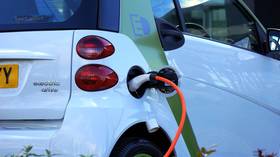Carmakers face supply bottleneck of this crucial metal
Demand for battery metals continues to grow, and while carmakers were concerned about a lithium and cobalt shortage in recent years, they seem more concerned about nickel nowadays.
Tesla and its battery producer partners, and other automakers and their suppliers, are worried about the longer-term supply of nickel according to a new study by BloombergNEF.
The study predicts that EV makers will be driving demand for nickel about 16 times to 1.8 million tons in the next years.
Also on rt.com Tesla stock continues to crash as Morgan Stanley adds fuel to the fireClass-one nickel, a high-purity material used in batteries, is expected to see demand greatly outstrip supply in the next few years. That will be fueled by meeting the large Chinese EV market, and other global markets where demand is expected to grow.
That need for class-one nickel will outstrip supply within five years, according to the study.
One problem has been a lack of real investment in new mines for materials including nickel, Tesla’s global supply manager of battery metals, Sarah Maryssael, said at a Washington meeting in May. That could drive up prices as battery demand increases greatly.
Tesla CEO Elon Musk is concerned about having enough economically viable — and available — metal to continue meeting its growing electric car demand. That will take off even more as the company taps into China’s booming markets.
Also on rt.com Huawei teams up with automakers to launch self-driving cars – report“They are getting ready to have the new factory in China, and are at full capacity in North America,’’ Peter Bradford, chief executive officer of nickel producer Independence Group NL, said. “They recognize the biggest risk from a strategic supply point of view is nickel.’’
Bradford last week met with one of Tesla’s battery metals supply chain team. His company, Perth-based Independence, last year increased nickel output from its Nova mine in Western Australia. Independence will be spending as much as A$75 million ($51 million) on exploration in an effort to extend the asset’s life and find new deposits.
Bradford’s industry had been focused mainly on supplying the metal to stainless steel. By 2030, the BloombergNEF study expects that batteries will account for more than half of demand for the valuable class-one nickel.
Metal suppliers have been scrambling to find the right metal to fill that demand. Australian firm BHP, the biggest maker, is betting on bright-turquoise colored nickel sulphate. That will be taking place at its nickel refinery south of Perth, with plans to potentially carry out the industry’s largest expansion.
The mining company had been seeking a buyer for its Nickel West facility, but reversed course recently after reviewing growth forecasts in lithium-ion batteries and a scarcity of high-quality nickel supply.
The challenge will be there to mass produce more affordable EVs and meet consumer demand in China and other key markets; battery costs have been the biggest stumbling block to reaching that sales volume. Increasing government mandates to bring in more EVs is part of the forecast, with incentives being offered and alliances being forged to increase public charging stations.
Tesla is seeing car buyers impatiently waiting for delivery of their Model 3 electric cars. The company is betting that its upcoming Model Y will be in strong demand, and is already preparing to have production capacity in place more in line with the popular Model 3.
The Model 3 looks like a smaller version of the Model S, and the Model Y will be available to car shoppers interested in the crossover SUV functionally of the Model X, but also want to have a more affordable and smaller alternative. Musk is also promising that the Model Y will have 300 miles of range, which would address a critical concern for buyers ready to leave their gasoline-powered cars behind for the first time ever.
A new Wood Mackenzie study sees the metals problem much broader, with lithium, cobalt, and nickel supplies to be worst hit over the next few years.
Also on rt.com Back with a vengeance: Oversold lithium could be about to rallySupply for the three metals is fine for now, said Gavin Montgomery, research director at Wood Mackenzie. Short-term market prices have fallen, and that will deter producers from increasing supply to meet future demand, he said.
But long-term that will change. Demand is expected to grow so rapidly with car makers taking on their ambitious goals to mass produce EVs, that metal suppliers won’t be able to keep up, Montgomery said.
Automakers and their battery partners need to start planning for it now.
“Getting the quantity of nickel that (electric vehicles) will need by the mid-2020s will be a challenge ... with lead times often up to 10 years, investment needs to happen now,” Montgomery said.
This article was originally published on Oilprice.com















